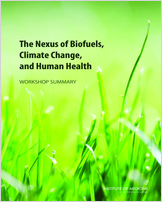NCBI Bookshelf. A service of the National Library of Medicine, National Institutes of Health.
Liquid fuels are a major part of modern life. They supply energy for ground, water, and air transportation as well as power for industrial and farming machinery. But fossil fuels - the dominant liquid fuel in use for well over a century - have many disadvantages. The use of fossil fuels has obvious health downsides, such as emissions of pollutants that are directly harmful to health. The burning of fossil fuels produces greenhouse gases, which contribute to global warming, itself a long-term threat to human health. There have also been health concerns related to insecurity of liquid fuel supplies and the potential of international conflicts being caused by fuel scarcity. Furthermore, there are concerns that the world's large but still limited supply of fossil fuels could be strained by the increasing demand that results from societies around the world achieving greater prosperity. In the face of these concerns, new policies have been created that encourage the development of renewable sources of energy in general and biofuels in particular.
In January 2013, the Roundtable on Environmental Health Sciences, Research, and Medicine of the Institute of Medicine held a 2- day, interactive, public workshop on the intersection of biofuels, climate change, and human health. Workshop attendees explored public health issues related to the composition of traditional and alternative fuels and fuel additives, and they discussed the known and potential health impacts associated with the use of these fuels and fuel additives. The Nexus of Biofuels, Climate Change, and Human Health is the summary of that workshop. This report examines air, water, land use, food, and social impacts of biomass feedstock as an energy resource, and the state of the science and health policy implications of using different types (and generations) of biofuels as an energy source.
Contents
- THE NATIONAL ACADEMIES
- PLANNING COMMITTEE FOR THE WORKSHOP ON THE NEXUS OF BIOFUELS, CLIMATE CHANGE, AND HUMAN HEALTH
- ROUNDTABLE ON ENVIRONMENTAL HEALTH SCIENCES, RESEARCH, AND MEDICINE
- Reviewers
- Preface
- 1. Overview
- 2. Case Study: The Palm Oil Example
- 3. Occupational Health and Biofuels Production
- 4. Biofuels Impact on Air, Atmosphere, and Health
- 5. Water Use, Water Pollution, and Biofuels
- 6. Implications of Biofuels for Land Use and Health
- 7. Ethical and Social Issues
- 8. Biofuels and Food Security Issues
- 9. Environmental Health Policies and Opportunities
- 10. Government Perspectives on Biofuels and Human Health
- 11. Closing Session
- APPENDIXES
Rapporteur: Robert Pool.
This activity was supported by contracts between the National Academy of Sciences and the National Institute of Environmental Health Sciences, The Kresge Foundation, Colgate-Palmolive Company, ExxonMobil Foundation, and Royal Dutch Shell. The views presented in this publication do not necessarily reflect the views of the organizations or agencies that provided support for the activity.
Suggested citation:
IOM (Institute of Medicine). 2014. The nexus of biofuels, climate change, and human health: Workshop summary. Washington, DC: The National Academies Press.
NOTICE: The workshop that is the subject of this workshop summary was approved by the Governing Board of the National Research Council, whose members are drawn from the councils of the National Academy of Sciences, the National Academy of Engineering, and the Institute of Medicine.
This summary is based on the proceedings of a workshop that was sponsored by the Roundtable on Environmental Health Sciences, Research, and Medicine. It is prepared in the form of a workshop summary by and in the name of the rapporteur as an individually authored document.
- NLM CatalogRelated NLM Catalog Entries
- Review Microbial Energy Conversion: This report is based on a colloquium, sponsored by the American Academy of Microbiology, convened March 10-12, 2006, in San Francisco, California[ 2006]Review Microbial Energy Conversion: This report is based on a colloquium, sponsored by the American Academy of Microbiology, convened March 10-12, 2006, in San Francisco, California. 2006
- Review Design Criteria for Future Fuels and Related Power Systems Addressing the Impacts of Non-CO2 Pollutants on Human Health and Climate Change.[Annu Rev Chem Biomol Eng. 2015]Review Design Criteria for Future Fuels and Related Power Systems Addressing the Impacts of Non-CO2 Pollutants on Human Health and Climate Change.Schauer JJ. Annu Rev Chem Biomol Eng. 2015; 6:101-20. Epub 2015 Jul 2.
- Attributed radiative forcing of air pollutants from biomass and fossil burning emissions.[Environ Pollut. 2022]Attributed radiative forcing of air pollutants from biomass and fossil burning emissions.Jiang K, Fu B, Luo Z, Xiong R, Men Y, Shen H, Li B, Shen G, Tao S. Environ Pollut. 2022 Aug 1; 306:119378. Epub 2022 Apr 29.
- Biofuels that cause land-use change may have much larger non-GHG air quality emissions than fossil fuels.[Environ Sci Technol. 2012]Biofuels that cause land-use change may have much larger non-GHG air quality emissions than fossil fuels.Tsao CC, Campbell JE, Mena-Carrasco M, Spak SN, Carmichael GR, Chen Y. Environ Sci Technol. 2012 Oct 2; 46(19):10835-41. Epub 2012 Sep 20.
- The legacy of fossil fuels.[Chem Asian J. 2011]The legacy of fossil fuels.Armaroli N, Balzani V. Chem Asian J. 2011 Mar 1; 6(3):768-84. Epub 2011 Feb 3.
- The Nexus of Biofuels, Climate Change, and Human HealthThe Nexus of Biofuels, Climate Change, and Human Health
Your browsing activity is empty.
Activity recording is turned off.
See more...
